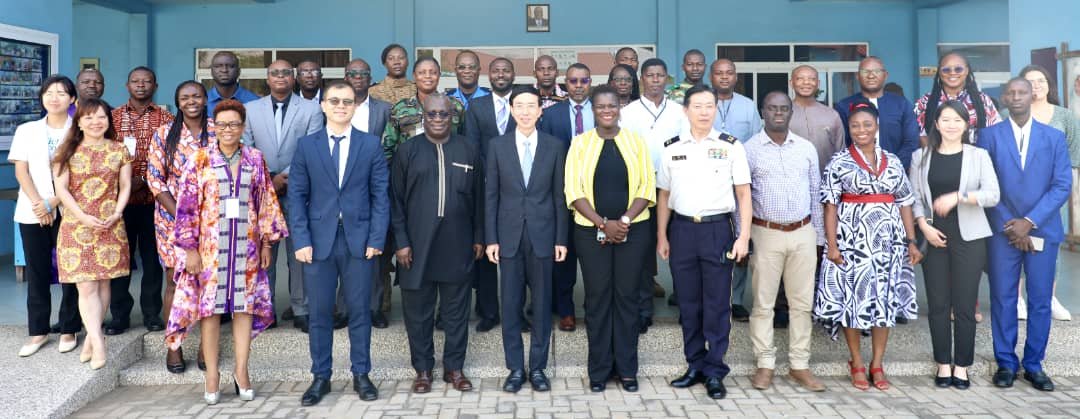In a united effort to address the escalating challenges of violent extremism and arms proliferation in West Africa, the Kofi Annan International Peacekeeping Training Centre (KAIPTC), in partnership with the United Nations Development Programme (UNDP), trained security personnel and civil society actors. This is to strengthen their roles in preventing and countering terrorism, violent extremism, and trafficking of small arms and light weapons.
The training participants were drawn from seven West African countries: Benin, Togo, Ghana, Cote d’Ivoire, Niger, Mali, and Burkina Faso.
Bararmna G. W. Rosine, a community peace mediator with WANEP in Togo, highlighted the impact of the training. As a woman peace mediator, she stressed the importance of women’s involvement in efforts to prevent terrorism and expressed eagerness to leverage the acquired knowledge upon her return. She stated that, “the program has deepened my understanding of violent extremism, radicalization, and terrorism. Equipped with the knowledge gained, back to my country, I plan to organize awareness-raising initiatives for women and young people”.
The training program forms part of a broader year-long project titled ‘Preventing Violent Extremism, Radicalisation, and Small Arms Proliferation in the Sahel and adjoining Coastal Countries in West Africa’. It is being funded by the Government of Japan. The project aims at enhancing knowledge and information-sharing among security personnel and civil society actors to address the urgent need to prevent and counter terrorism, violent extremism, and small arms proliferation, diversions, and trafficking.
Carl Anetei Sowah from the Ghana National Commission on Small Arms and Light Weapons acknowledged that the training has provided an opportunity to enhance skills and exchange knowledge. He stated that:
“I now have a deeper appreciation of the Accra Initiative’s goals, focusing on preventing terrorism spillover from the Sahel and tackling transnational organized crime and violent extremism in member countries’ border areas. I have also gained an in-depth insight into conflict mapping, stakeholder analysis, conflict management, and conflict resolution”.
Sukhrob Khoshmukhamedov, UNDP Deputy Resident Representative in Ghana, emphasized the crucial role of collaboration in sustaining peace and preventing violent extremism. He noted that, “UNDP remains committed to enhancing the capacities of all involved to promote peace, sustain social cohesion, and prevent the spread of violent extremism.”
The project responds to the alarming findings of the Global Terrorism Index, with the Sahel region now accounting for 43% of global terrorism deaths. In this regard, Major-General Richard Addo Gyane, Commandant of KAIPTC, expressed gratitude for the timely support from the Japanese Government and the UNDP. He emphasized the pivotal role of the project in strengthening regional initiatives and ensuring a more secured Sahel and coastal West Africa.
“This course is instrumental in fostering collaboration, and ultimately ensuring a more secured and resilient Sahel and coastal West Africa”, noted Major-General Addo Gyane.
H.E MOCHIZUKI Hisanobu, the Japanese Ambassador to Ghana, underscored Japan’s commitment to safeguarding global peace and security and in advancing human and economic progress. He considers this project as a symbol of that dedication stating: “this project, supported by Japan, symbolizes our commitment to global peace & stability, acknowledging the urgent need to address security challenges.”
The project’s activities involve capacity development, training of trainers, and a regional policy and experience-sharing seminar to address the escalating insecurity linked to violent extremism in the region. The aim is to prevent terrorism in the Sahel and coastal West Africa.
The lecturers of the course include Prof. Urakami Norihisa (LTC) of the National Defence Academy of Japan, Mrs. Afua Lamprey, Prof. Kwesi Aning, Prof. Mustapha Abdullah, Mr. John Pokoo, Mrs Margaret Akakpo, Dr Victor Doke, Mr. Johnson Asante-Twum, and Mrs Serwaa Allottey-Pappoe.








